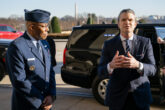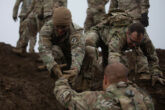June 07, 2022
Sharper: Pride in National Security
Analysis from CNAS experts on the most critical challenges for U.S. foreign policy.
In order for the United States to maintain its strategic advantage, the national security community must be able to access the nation's top talent and draw from their strengths in both uniformed and civilian national security leadership. CNAS experts center the role of the LGBTQ+ community in national security leadership through public conversations and research. Continue reading this edition of Sharper to explore the impact of the LGBTQ+ community in national security.
Features
Don’t Ask, Don’t Tell Repeal: Reflections 10 Years Later
September 20, 2021 marked the 10-year anniversary of the Don’t Ask, Don’t Tell (DADT) repeal implementation, which ended the 17-year military personnel policy enforced by the Department of Defense (DoD) and the military services. Implementation of the policy’s repeal required coordination between Congress, DoD leadership, and service-level leadership, and included the perspectives of service members, veterans, and advocates. CNAS hosted a virtual panel with key decision makers involved in the change management required to fully implement the repeal of DADT.
Strategic Readiness: Meeting the Challenges of Today and Tomorrow with the Honorable Shawn Skelly
Force readiness is a crucial indicator of whether the U.S. military is prepared to execute the National Defense Strategy. The Center for a New American Security hosted the Honorable Shawn Skelly, Assistant Secretary of Defense for Readiness, in conversation with Becca Wasser, Fellow for the Defense Program at CNAS, to discuss how the Department plans to build, maintain, and balance warfighting capabilities and competitive advantages to achieve strategic objectives both today and tomorrow.
New York State Minority Veteran Needs Assessment
After 9/11, initial public displays of support for service members coalesced into what has been called a “Sea of Goodwill” consisting of public, private, and nonprofit organizations offering programs and services to military personnel and veterans, their families and caregivers, and survivors. Collaborative efforts have led to tremendous progress in addressing some identified challenges: The number of homeless veterans nationwide has been cut in half, and veteran unemployment has been lower than that of nonveteran peers for nearly two years. At the same time, these gains have not manifested to the same degree across the entire veteran population: Disparities exist between the outcomes of minority veterans and their nonminority veteran peers. This report assesses the extent of those disparities for women; racial/ethnic minority veterans; and lesbian, gay, bisexual, and transgender individuals.
The Costs of Policy; Serving While LGBTQ
The Military, Veterans, and Society Program at the Center for a New American Security and the Athena Leadership Project held a roundtable to discuss the experiences of LGBTQ service members and the costs of the Don’t Ask, Don’t Tell policy. The discussion further highlighted how the military services can better access and retain top-tier talent in an increasingly diverse nation. The panel discussion was moderated by Athena Leadership Project co-founders and CNAS Adjunct Senior Fellows Dr. Jeannette Gaudry Haynie and Dr. Kyleanne Hunter. The event was hosted by CNAS Senior Fellow and Program Director Kate Kuzminski.
New York State Minority Veteran Needs Assessment
It is imperative to develop a deeper understanding of whether there are specific veteran subpopulations that are faring differently from their peers...
Virtual Event: The Costs of Policy; Serving While LGBTQ
Oct 14, 2021
Commentaries
Taiwan to Host First WorldPride in East Asia: Why That’s Important
"Although not an easy win for human rights activists, Taiwan became the first jurisdiction in East Asia to legalize same-sex marriage in 2019 and the island continues to show support for its LGBTQ citizens," observes Jason Bartlett in The Diplomat. "Over the course of five days, more than 300 member organizations worldwide met virtually through the InterPride 2021 General Meeting & World Conference to choose between two locations for WorldPride for 2025: Kaohsiung City and Washington D.C. Kaohsiung Pride won the bid over the Capital Pride Alliance of Washington D.C., marking a major milestone in global pride. Darien Chen, the spokesperson for Kaohsiung Pride, issued a statement following the results declaring that “This is the beginning of a 4-year journey that we plan to ignite change in Asia, to promote InterPride’s mission, and to advance human rights in the world.” While certainly a victory for all LGBTQ persons and their allies, neighboring Beijing and Seoul will likely maintain a reticent stance against supporting LGBTQ rights."
The Trans Ban Is Gone but More Needs To Be Done
"President Biden’s decision to rescind the ban on transgender service members in the armed forces within a week of taking office is a welcome development for a diverse, inclusive and competent military," argues Nathalie Grogan in Inkstick. "Despite decades of discrimination, transgender troops have served their country in all branches of the military. While important, meaningful and necessary, however, simply lifting the ban put in place in 2018 isn’t enough to counteract the discrimination transgender service members and veterans continue to face. The next steps for the Department of Defense should be to expand the data available on currently serving transgender personnel, develop a targeted recruitment strategy to reach a more diverse population, and protect LGBT service members from all types of harassment and abuse."
Taiwan to Host First WorldPride in East Asia: Why That’s Important
Washington should encourage its allies in the region to view Taiwan as a model for equal human rights for all and not as an exception to the status quo....
The Trans Ban Is Gone but More Needs To Be Done
Simply lifting the ban isn’t enough to counteract the discrimination transgender service members and veterans continue to face....
Around the Table with Lucas Schleusener
Around the Table is a three-question interview series from the Make Room email newsletter. Each edition features a conversation with a peer in the national security community to learn about their expertise and experience in the sector. Lucas Schleusener is the Director of Public Policy at QOMPLX and the Co-Founder and President of Out in National Security (ONS). The views expressed are those of the author and do not reflect the position of QOMPLX or ONS.
Don’t Ask Us to Serve
"Since the repeal of DADT, the lives of queer servicemembers have improved, but major challenges remain that threaten to undermine these gains and stall further progress," writes Cody Kennedy for Inkstick. "The four main issues that the US military needs to focus on that disproportionally impact LGBTQ+ current and former servicemembers are sexual assault, the HIV ban, dishonorable discharges received prior to the repeal of DADT, and the anti-sodomy law. Addressing these four problems could help mitigate threats to queer servicemembers that affect their ability to perform tasks effectively, live healthy lives, and pursue a long-term military career. Furthermore, by taking these steps the US military can improve its image and establish trust with the LGBTQ+ community, which has often been ostracized by military culture. The important question is: Is the US military and Congress willing to take these steps?"
Around the Table with Lucas Schleusener
Around the Table is a three-question interview series from the Make Room email newsletter. Each edition features a conversation with a peer in the national security community ...
Don’t Ask Us to Serve
Since the repeal of DADT, the lives of queer servicemembers have improved, but major challenges remain that threaten to undermine these gains and stall further progress....
About the Sharper Series
The CNAS Sharper series features curated analysis and commentary from CNAS experts on the most critical challenges in U.S. foreign policy. From the future of America's relationship with China to the state of U.S. sanctions policy and more, each collection draws on the reports, interviews, and other commentaries produced by experts across the Center to explore how America can strengthen its competitive edge.
Subscribe
Sign up to receive the latest analysis from the CNAS expert community on the most important issues facing America's national security.
Thank you for registering! You will receive a confirmation email shortly. All CNAS events are free, open to the public, and viewable from cnas.org/live.
Stay up-to-date with report releases, events, major updates, and announcements from the Center for a New American Security.
More from CNAS
-
Hegseth Brings the Culture War to Combat
The fundamental challenge of military leadership lies in creating cohesive teams that can work together in an environment of mortal risk and, when called upon to do so, use le...
By Dr. Jason Dempsey
-
Hegseth Says Trump Boosted Military Recruiting. It’s Been Improving for over a Year
Defense Secretary Pete Hegseth says military recruiting has shot up since the Trump administration's return. In fact, it's been improving for at least a year, with big jumps i...
By Taren Sylvester
-
Pete Hegseth’s Views About Women and Military Standards
In recent weeks, Hegseth walked back comments made while promoting his book, where he said women did not belong in ground combat units. Without citing specific examples, he co...
By Katherine L. Kuzminski
-
Sharper: Trump's First 100 Days
Donald Trump takes office in a complex and volatile global environment. Rising tensions with China, the continued war in Ukraine, and instability in the Middle East all pose s...
By Charles Horn












